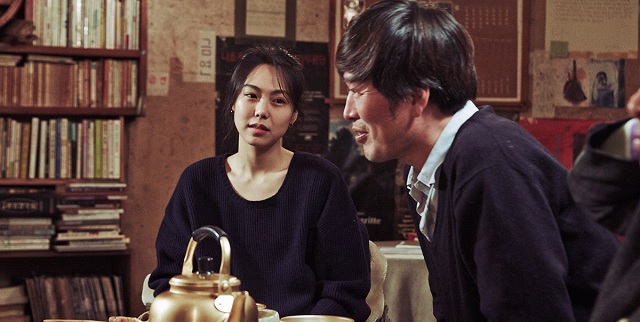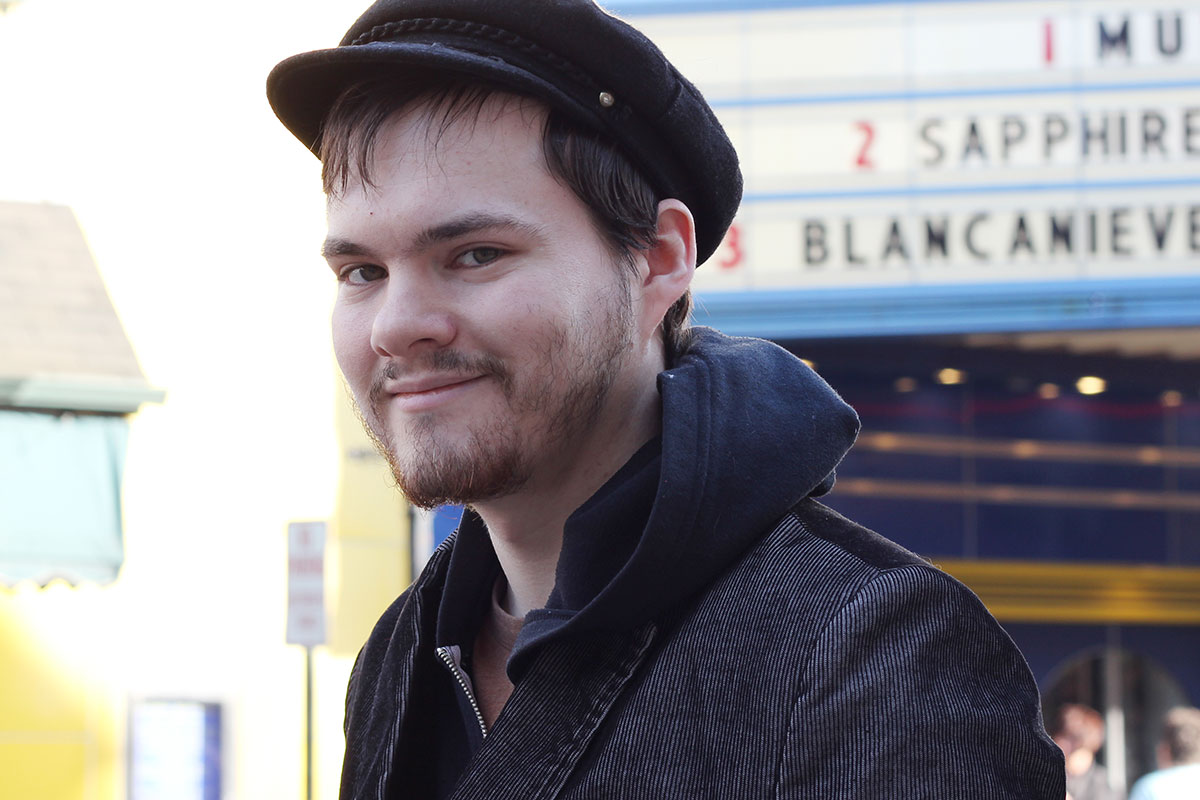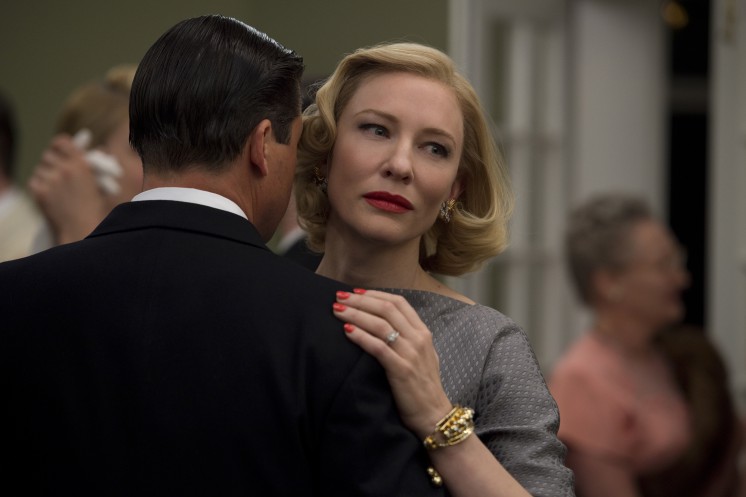Film festivals have an odd push-pull relationship with exclusivity. As Godfrey mentioned in his last dispatch, we were treated to Danny Boyle’s rather remarkable “Steve Jobs” (almost more marathon than movie), after the audience at Telluride got first dibs, but Boyle was quick to assure us that we were seeing the final cut. Telluride had seen something else. New York was getting the real thing. We do thrive on that feeling, don’t we? That we were first, that we’re special. Thankfully the films can give us that feeling regardless of when we see them. It didn’t matter a whit that I waited four months to watch Todd Haynes’ “Carol” after the first round of critics got their eyes on it at Cannes. A film like “Carol” overrides earthly concerns like time and envy. It rushes through you like a one-of-a-kind endorphin, coating your veins and synapses in velour on the way to your brain. You could see it ten years from now and your reaction to it would be unchanged. Though the context in which you watch it may prove important.
For newcomers, it’s the story of a woman (Rooney Mara) who falls for someone who appears to be the first strong sexual presence she’s ever encountered. That this person happens to be Cate Blanchett at the height of feline intensity (someone give her an award already; this is her best work), at a time when “civilization” was still getting used to the idea of homosexuality, presents more than a few problems for both parties.
Our own Barbara Scharres gave “Carol” a thorough going over at Cannes, explaining why it didn’t work for her—that Haynes offered no sense of the lives its heroines lead before we meet them, and I’ve read this complaint elsewhere. I understand it to a degree, but both Haynes’ images and Mara and Blanchett’s precise body language tell me everything I need to know about the interior life of these characters. It helps I think, that this film, which speaks the language of the heart and the stomach more than the logical mind, represents a release of sorts for its creator. Haynes is an incredibly intelligent filmmaker and has in the past presented himself as a sort of homage engineer. He’s answered the question of how to best pay tribute to a subject, film or artist without being emotionally or representationally vulgar. A film about Bob Dylan becomes a film about the idea of Bob Dylan through the narratives he’s presented of his own identity to the public. A remake of “All That Heaven Allows” becomes a way to shift the dynamic in order that it remain both distant enough from the original and still relevant to both past and present. And all these solutions are fascinating and have made for very impressive work, but there’s always been a sense of the intellectualization of aesthetics and theme getting in the way of the emotional potential of each subject. I never leave less than totally aware how each film’s milieu or idea effected Haynes development as an artist, but that’s not enough to garner repeat viewings. He’s apparently applied that remarkable brain of his to the problem of how to let me become invested in his protagonists because I fell head over heels in love with “Carol.”
It’s a film of real, relatable moments presented as the most important aspects of its characters lives together, which is why I didn’t need Haynes to explain to me who Therese and Carol were. The way they act in public vs. the way they act when they’re alone with each other tells me everything. The way Therese leans in to smell Carol’s perfume. The way they want to respect (and not respect) each other’s privacy, even as they yearn not to. The way Therese’s eyes light up (Mara’s eyes are her greatest asset) when she thinks she might be drawn further into Carol’s orbit. Ed Lachman’s photography presents them like a pair of phoenixes, rising from the dusty mores of Eisenhower’s America.
Two documentaries playing the festival dovetail with “Carol’s” dual leads—”The Witness” (covered by Godfrey) draws a portrait of a young woman’s awakening sexuality in New York before it’s tragically cut short. “Ingrid Bergman: In her Own Words,” about the jaw-dropping actress, was also sort of put on trial for her infidelity in America as Carol is by her husband (the ever-dependable Kyle Chandler). There’s even a little of “Don’t Blink: A Film About Robert Frank,” in Therese’s interest in photography. These coincidental reference points are a sign of Haynes relinquishing his ideological hold on the subtext of his movies. Ten years ago, Haynes would have drawn these conclusions for us. He’s rightly confident in “Carol’s” power as drama to let its cathartic rush be entirely on romantic terms. He knows that most everyone in the audience will have felt these feelings, in some form or other. There’s no need to comment on longing—it’s universal.

I had a similar feeling watching Hou Hsiao-Hsien’s “The Assassin,” the Taiwanese master’s latest in almost a decade. The director spoke about wanting to find the reality in the fantastic conventions of the Wuxia genre at the Q&A following the press screening. It’s fair to say he’s done just that, but more accurate to say he found his own truth by treating the past with the same grace he’s always granted the present. In the film, Shu Qi plays a killer sent to murder an official (Chen Chang) with whom she shares a past. That turns out not to matter because “The Assassin” is like a painting that dances to life. Hou’s images are at once stark and silky, shifting focus and centrality, welcoming intrusions from heavy bodies and weightless natural splendour. Psychologies are slowly revealed, like the complexities of the plot, but both are hardly as important as the way Shu Qi stands, the way she makes a fist, the way her clothing seems to have been tailored to make room for her soul rather than her body. Hou is guided by a spiritual femininity in his discursive montage, his attention to details and movement rather than events. It reminded me of Chantal Akerman, who used to stare at the behavior of women with the same unwavering yet unspoken support. There were moments in both “The Assassin” and “Carol” where I found myself dumbfounded by the joy of watching flawless technique. I could do little but try to keep from laughing. I was so giddy from the highs of both films that I could hardly contain myself.

At this point in the festival I welcomed the rush of images, because my brain is bent out of shape by the rigourous schedule. Interviews and early screenings cutting into an already negligible sleep schedule are every journalist’s lot. Add to that chaotic variables like the tragic passing of Akerman, the quitting of my stressful day job and looking for another. In short, there’s a no-vacancy sign lit up in the part of my mind that welcomes dissonance and oblique exercises. Which is why I’m glad I caught Hong Sang-Soo’s “Right Now, Wrong Then” (or “Right Then, Wrong Now”) over a week ago. I don’t know that I’d still be in the mood for its melancholy duelle. At the time, however, I knew I was watching something special. Hong’s just as fiercely smart as Haynes, though they play different games. Hong’s been stimulated the last few years through chronological deck shuffling and dream-logic. “Right Now, Wrong Then” is perhaps his most satisfying outright experiment in that it finds the same truth despite variations in the orchestration of events.
For the first hour we watch a director meet a woman and try to woo her at her studio, a bar and a party. They part ways in time for the director to attend a disastrous Q&A at a local film festival. Then Hong hits the reset button and plays the same events again, allowing for minute differences in their interactions which alter the conclusion of their meeting in a meaningful way. Hong lets the scenario—touching, sad and funny both times—gently play out and lets us see that human behavior can appear to change depending on slight changes. The director isn’t presented as a better or worse person, just more or less able to control his social honesty. What’s hilarious is seeing how some of his most appalling behavior can wind up having had no impact on his fortune, while a white lie titanically shifts the course of his day. Hong hasn’t changed a line of his aesthetic playbook in the last five years and as long as the results are this sweet and funny, he never needs to.












